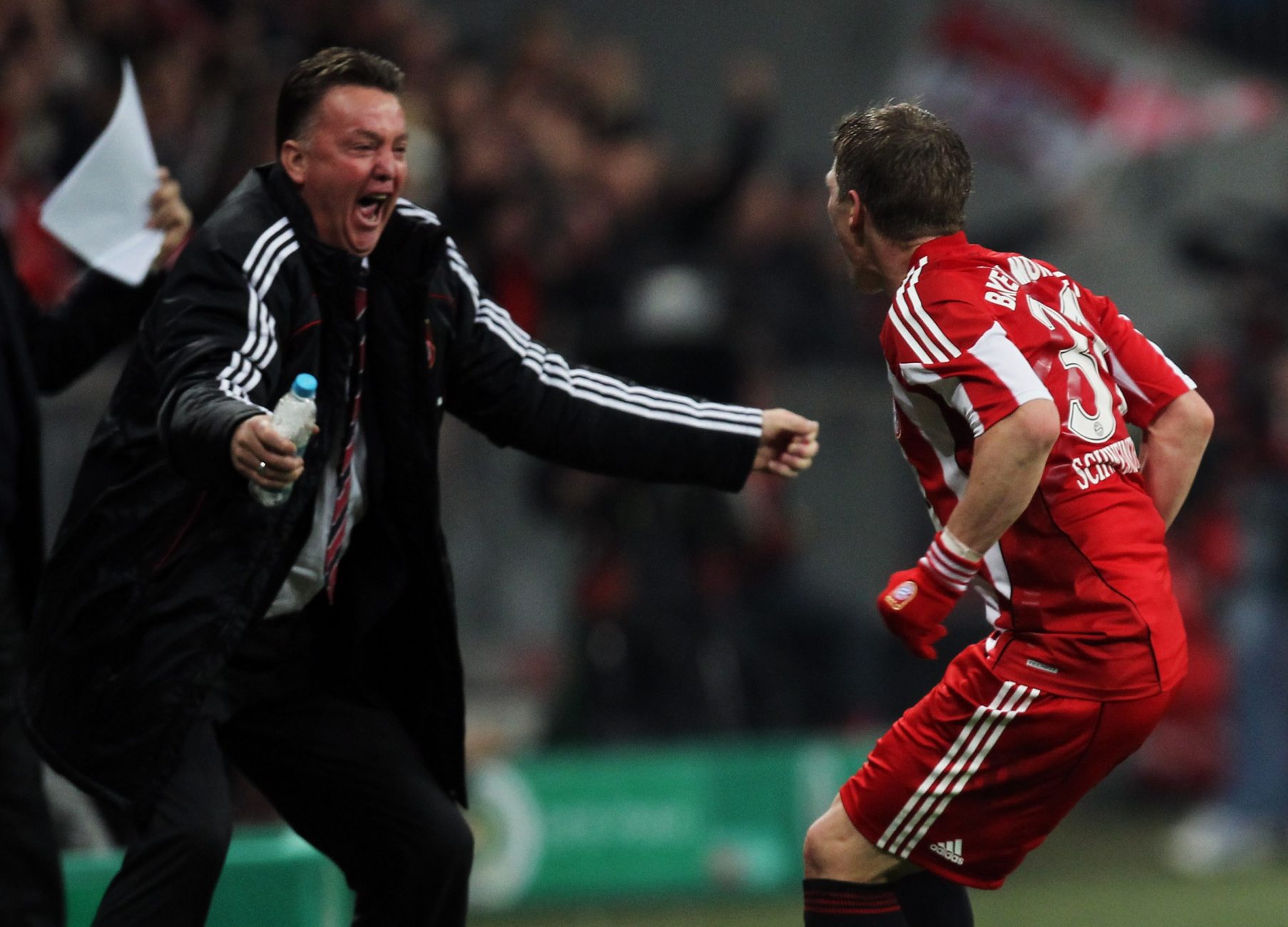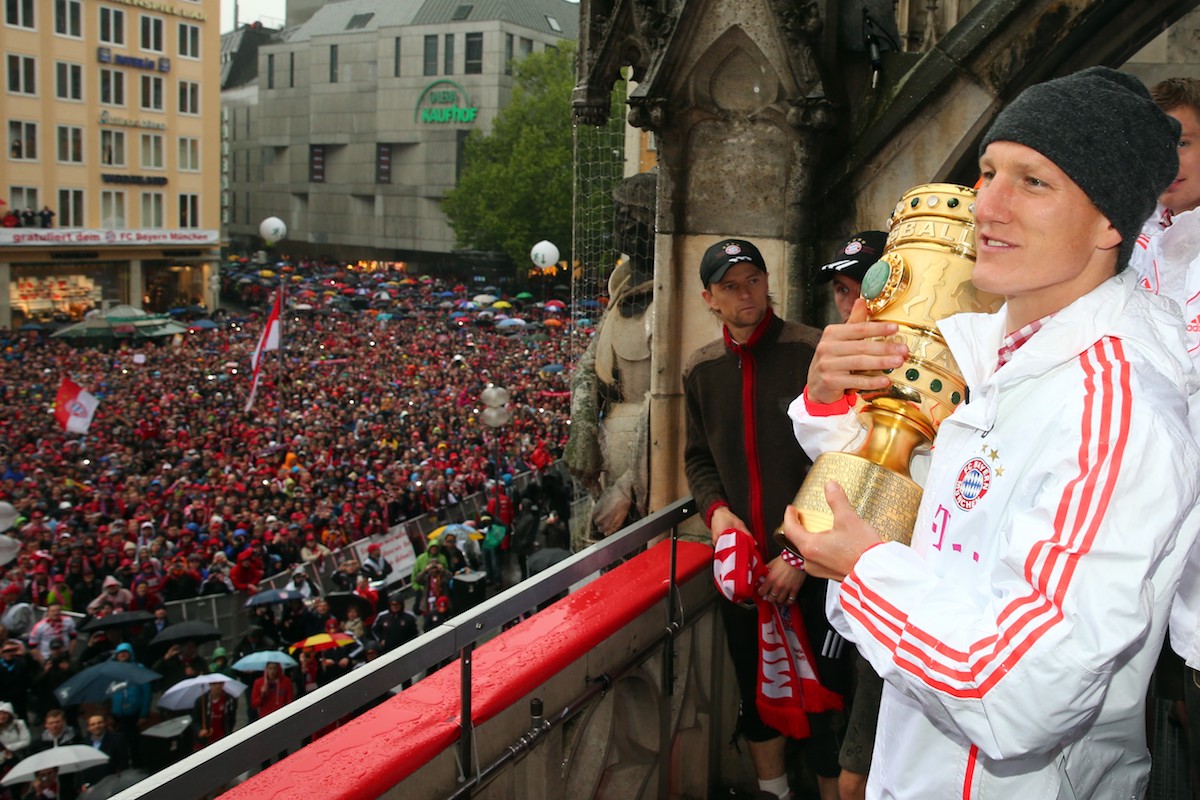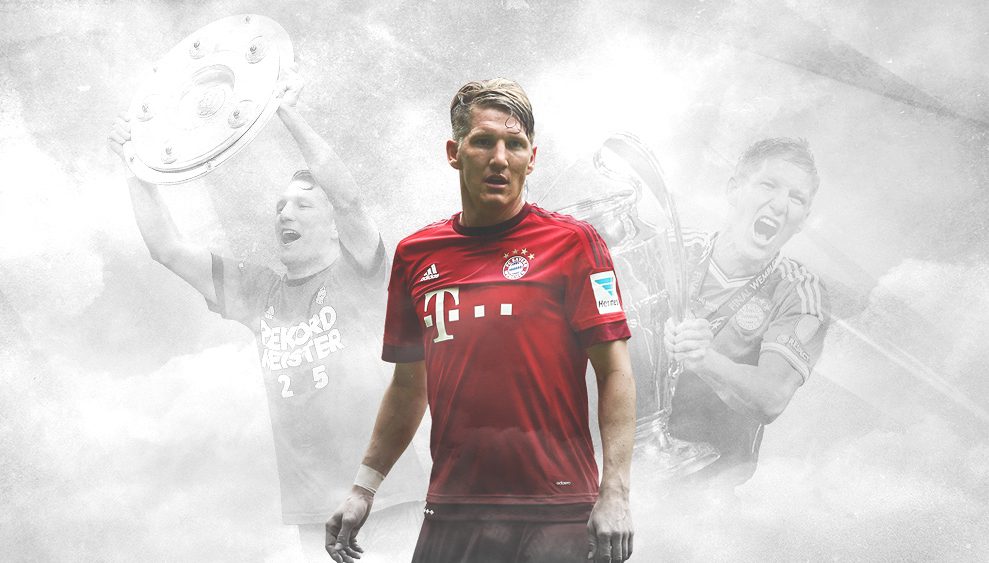Servus, Basti!
When Jupp Heynckes stood on Munich city hall’s balcony in the summer of 2013, he was grinning broadly. “The older ones amongst you might remember,” he began, “that in 1990, I stood on this balcony and, slightly arrogantly, promised the European Cup. I’d like to make good on this promise now: here’s the European Champion Clubs’ Cup, the Chamions League.”
Heynckes lifted the trophy with the two big ears into Munich’s sky. Soon after, he turned back to his players, with an expression that said, “Always keep going! It’s worth it.”
A football nation’s hope
One of those players was Bastian Schweinsteiger, who looked as relaxed and happy as rarely ever before. His career was full of ups and downs – probably the biggest difference between him and Philipp Lahm, whose bad moments could be counted on one hand.
Schweinsteiger debuted for Bayern in 2002 on the biggest possible stage: the UEFA Champions League. In 2004, he went to the European Championships, rather spontaneously. His first big event wasn’t exactly successful, but if there was one positive realisation during that tournament, it was that there were young players who could help change things in the future.
He became an entire footballing nation’s hope early on. By the time he played in his home country at the 2006 World Cup, he and Podolski and Lahm had become the face of a new generation. A generation that should finally bring Germany a World Cup title again.
But the road was rocky and complicated. For Schweinsteiger, a time followed in which he not only lacked consistency in his performance, but in which his personality was suddenly called into question. A phase of self-discovery began.
At night with his “cousin” in the Bayern swimming pool, constantly changing hairstyles, posing in various magazines and the nation’s absolute sunnyboy – in the meantime people were not sure whether “Schweini” would have what it takes to exercise his profession seriously enough to exploit all his talent.
Not only Uli Hoeneß was of the opinion that Schweinsteiger should grow up rather quickly. The development from a young “Schweini” to an experienced Schweinsteiger took some time. When Louis van Gaal took over in Munich, however, a role was finally found for him that would significantly change his future and that of FC Bayern.
On the six – alongside Mark van Bommel – he grew up as strategist and regista of his team. There he controlled the game. Van Bommel had his back, while Schweinsteiger was the soul and heart of Van Gaal’s philosophy.
Champions League final, Double, a furious world cup – Schweinsteiger embodied success in 2010, he took a big step in the hierarchy this season and increasingly showed himself to be the leader on and off the pitch.

(Photo: Alexandra Beier / Bongarts / Getty Images)
Discussing real “characters”
But not everyone saw it that way. For parts of the public, Schweinsteiger was a symbol for a generation that would lack the unique selling point. The lack of leaders like Effenberg, Kahn or other former captains of large teams was criticized. Schweinsteiger accepted the sometimes unobjective criticism without comment. Until 2011.
“Asshole”, “wanker” – his anger got the best of him in April in front of some journalists. Since van Bommel’s transfer the team has been lacking real characters, it was said at that time. It was the start of an exhausting discussion, which was mainly led by Springer. A scapegoat was sought to draw the complex crisis of FC Bayern to a populist and simple level.
The generation Lahmsteiger did not deliver any titles. It owes a proof that its way of leading a team can actually be successful. The term ” flat hierarchy ” increasingly developed into a symbol of a supposedly colourless generation of players. Schweinsteiger was obviously hit very hard by the impact of this debate, otherwise he would not have reacted like that. In any case he had to fight with many injuries at that time, which annoyed him enough.
But when he finally got back into shape in the 2011/12 season, he was able to take his team to another Champions League final. In midfield, he regained his dominance and found his game. His penalty kick in the Bernabéu remains unforgotten. “Schweinsteiger! Schweinsteiger! Hasta la vista, Bayern finalista”, Wolff-Christoph Fuss shouted into the microphones. It was a time when the Fußballgott finally became the FC Bayern hero.
Even in the “Finale Dahoam” he set the pace and made a big game. But then came the penalty shoot-out. Already in Madrid Schweinsteiger had to go this long way. In Munich his legs became even heavier. If he missed, Drogba would have the great chance of making Chelsea the Champions League winner.
Schweinsteiger took a deep breath. Silence. He ran up. In a few moments, a single shot would decide the evaluation of his entire season, perhaps even his entire career. The ball hit the post, Schweinsteiger buried himself in his jersey, Drogba converted and ended all Bayern dreams.
There is no moment that explains my inner connection to Bastian Schweinsteiger as well as this one. This simultaneous collapse, this pain, this emptiness. When it seemed as if Schweinsteiger’s roller coaster was going back to the top, it crashed into the abyss at a hell of a pace. His roller coaster ride was also that of the Bayern fans. Every failure and every success was inevitably linked to Bastian Schweinsteiger – and that for almost my whole life.
The image of a good player, who would never become a big player, seemed to spread increasingly in public due to this mistake. But not in Munich. There he was the Fußballgott. Most fans suffered with him, they celebrated with him, they cried with him, they stood by him. Schweinsteiger had earned this trust in the years before and developed into a role model, idol and identification figure for the entire club for a large number of Bayern fans of my age. He was protected and defended by the fans. And rightly so!
A long way to the throne
And so, a few months after this incomprehensible defeat, the journey began again from the very bottom to the very top. With a Schweinsteiger, who took a step forward again, grew with setbacks and could again use the negative experiences for himself. With Martínez at his side, who was able to keep his back as much as van Bommel once did.
Schweinsteigers development was most evident in the Champions League. He was the anchor in midfield and in the build-up. Against Juventus Turin he provided control in the midfield and created a constant additional player in the center. When Barcelona was a guest, it was Schweinsteiger who was the decisive chess piece in Heynckes’ plans to undermine the pressing of the world’s best team. Schweinsteiger checkmated Barça’s attack pressing with clever movements in the six space.
In the Champions League final it was the Fußballgott who brought the aggressive pressing of the opponent under control for his team at some point. As quarterback and libero, he brought FC Bayern into the match after 25 minutes.
In the final phase against Borussia Dortmund, Schweinsteiger became the driving force. Almost every attack originated with the Vice Captain. Again and again he organized and motivated his team-mates. When this final was finally won, Schweinsteiger and I collapsed again. Again we both cried. This time, however, with joy. The physical distance was huge, but emotionally I felt a unique closeness at every stage of his career.
It was an indescribable feeling for me and at the same time a surreal satisfaction, when Lahm and Schweinsteiger, with whom I had participated and suffered for over a decade, finally held this trophy in their hands. A long ball, a back heel pass and a poked goal suddenly turned them into great players and legends. For me they were the same before, but the trophy was the element I lacked to make my argument unassailable.

(Photo: Alexander Hassenstein / AFP / Getty Images)
That alone explains everything I don’t like about purely result-related evaluations. But they had finally made it. They had ascended Europe’s throne and shortly afterwards that of the world. Again with Bastian Schweinsteiger as the hero. With a bloodstained face, he beat down the Argentines in midfield. He organized his team, was again the driving force and the regista, despite a difficult season.
Schweinsteiger and Lahm were the leaders of a great generation. Many people doubted it in the meantime. However, anyone who was not interested in a media spin might have noticed the high quality of this generation of players. “Lahmsteiger” shaped this generation for more than a decade and carried German football from the valley to the summit of Maracanã in Rio. That’s why they stick out.
The 2018 World Cup showed what sporting quality is worth if it is not right in the team. Schweinsteiger and Lahm were decisive for cohesion and positive dynamics on and off the pitch. Together they were the model of a modern management style and they always remained true to themselves. They became successful with their convictions – not with those of Springer Verlag.
But for me it’s not the many titles that make these players special. Especially Bastian Schweinsteiger had to struggle with many setbacks in his career. He kept getting up. Again and again he dared a new attempt, questioned himself and developed further. He’s grown against the headwind.
In 2013 and 2014 he climbed to the throne. As huge as the distance between football professionals and fans has become, I felt connected to Bastian Schweinsteiger between 2002 and today. He aroused in me all the emotions that make football special.
His development, his failures, his resulting successes – Schweinsteiger has always served me as an example. Not because he’s done everything in his career to perfection. Not because he was always by far the best example. That would not be true.
The heights, but especially the many depths, have created a unique connection between me and a professional footballer, which I will never see again in my life. I cried and celebrated with Bastian Schweinsteiger. I learned from him. I’ve followed every step of his career.
In 2015 a little bit of my love for FC Bayern went with him. The club may always be bigger than the players, but Schweinsteiger will always be the player with whom I shared the most beautiful, impressive, worst and unique moments.
Now he’s back. For a game. For a moment. And I will go to Munich, say goodbye and enjoy his last appearance as a player in the Allianz Arena.
Football and FC Bayern continued to exist after Schweinsteigers transfer. But without him there will always be something missing. But maybe I can read something from his looks at the fans on Tuesday evening that he once learned from Jupp Heynckes: “Always keep going! It’s worth it.”
Hello Basti and thank you for everything!









